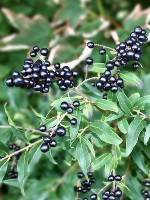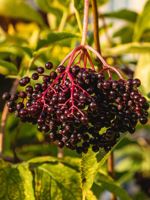Mon-Fri 9am - 5pm Mountain time
Wild Privet vs Bob Gordon Elderberry
Ligustrum vulgare
Sambucus canadensis Bob Gordon
NOT AVAILABLE THIS SEASON - MIGHT RETURN
Wild Privet is a fast growing ornamental shrub that is well suited for forming hedges and privacy screens. It will retain its leaves in warmer climates but drops them in colder areas. They have small white flowers, though the smell is often considered unpleasant. While the berries are inedible, they are a good food source for many bird species.
It is recommended to prune Wild Privet immediately after flowering, as it can readily self seed. It is deer and rabbit tolerant. It can grow in dry areas, on slopes, and withstand the wind making it well suited for many growing conditions.
Bob Gordon Elderberry is a Black Elderberry cultivar that produces berries that are larger and sweeter than other varieties, making it one of the top cultivars. It produces large clusters of white flowers that turn into large clusters of dark purple to black berries. The berries are well-suited for baked goods, jams, jellies, and syrups. It was selected from the wild in Missouri.
The large berry clusters that the Bob Gordon Elderberry produces will often end up hanging downward. This makes it more difficult for birds to feed on the berries. If birds are a concern, this might be the right berry for you.
Black Elderberries are considered to be partially self-pollinating. So while they will still produce some berries without cross-pollination, planting with another variety will increase yields. Consider planting with Black Elderberry or Ranch Elderberry.
Warning: the seeds, stems, leaves, roots, and uncooked berries are toxic to humans when eaten in quantity. Berries should be cooked to make them safe for human consumption.
Wild Privet Quick Facts
Bob Gordon Elderberry Quick Facts
Toxicity: If ingested, all parts of this plant will cause severe discomfort. Toxic to dogs, cats, and horses
Toxicity: leaves, stems, and uncooked berries are poisonous to humans

